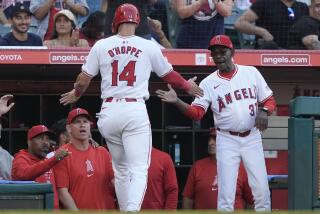BASEBALL 1992 PREVIEW : Carew Returns to Take a Swing or Two : Hall of Famer Is Proving to Be a Hit as the Angels’ New Batting Instructor
- Share via
He won seven batting titles and hit .300 or better 15 seasons in a row, but for five years after he quit playing, Rod Carew taught young hitters. Children really, some of them were very young, 9 and 10 years old. They tried to concentrate while a Hall of Famer moved their hands on the bat, adjusted their stances.
“When you walk into that building, I don’t want you to think of me as Rod Carew the player,” he would tell them. “I want you to think of me as Rod Carew, your teacher.”
With the children, it was like Shakespeare teaching the alphabet. There were older players, too, high school and college hitters who came to the baseball school Carew opened in Placentia. There were softball hitters--two of Carew’s three daughters play, and one, Stephanie, a high school junior, is a standout. Sometimes, often when the Placentia facility wasn’t crowded, major leaguers came by. Chili Davis was there a lot; Dickie Thon asked for help after he was hit in the face with a ball, wanting to adjust his stance so he could pick up the ball better despite his impaired vision. Whenever Toronto was in town, Carew would meet Tony Fernandez in the cages.
“He would come in after games, late at night,” Carew said. “Some nights we’d stay there until midnight, 1 o’clock.”
The thing Carew says he tried to teach his students was discipline, something that would help them outside the batting cage. They, in turn, taught him patience--something he might need a lot of in his new job as hitting instructor for the Angels, a team with a half-dozen or so players struggling to put poor offensive years behind them, a team that lost 182 runs batted in when it said goodby to Wally Joyner and Dave Winfield.
Carew appeared to take to his job quickly this spring. Around the cages, he is purposeful and efficient, speaking to hitters in quiet tones, checking his schedule to find the next hitter he wants to confer with. He looks more like a seasoned instructor than a former star back in uniform. His work at his hitting school might be the difference.
“It was almost like Rod had four or five years experience as a minor league hitting instructor,” said Manager Buck Rodgers, who hired Carew last winter, officially mending what had once been an awkward break between Carew and the team that sent him into involuntary retirement after the 1985 season.
Carew has made the transition from player to coach with grace. There are once-great players who are unable to describe how they did what they did, no more than by saying, ‘Like this. ‘ There are those who do not have the patience for others with less talent. Carew is not like that.
“People always wonder about ex-players who are good hitters, if they’re going to be good teachers,” Carew said. “I wasn’t too concerned about that, because I know I’ve got all the patience in the world to work with people. My thoughts are always positive. I’ll never say to a guy that he can’t do this or can’t do that. I will work with him to the point that he can get a feeling and know that he can do these things.”
Dick Schofield, who lost his starting shortstop position because of poor offensive performance, is one of the players whose confidence Carew has tried to build.
“He just suggests a few things instead of making you hit like he did--which you’re not going to be able to do,” Schofield said. “His approach is kind of like, whatever talent you have, go with that.”
Rodgers likes that about Carew, that he tailors his lesson to suit the pupil.
“He’s not a Charlie Lau or a Walt Hriniak, where you’re going to hit their way or not hit,” Rodgers said. “He comes in and takes their stance, their swing and kind of puts the icing on it. He doesn’t mess with the cake. His work is the icing.”
The details of Carew’s instruction can be very technical; the themes of his teaching are not. He wants his hitters to learn to be comfortable at the plate, to be prepared, to be disciplined and to adjust to the situation.
“From the start, I said I’m not going to try to change anyone from what they’re doing,” Carew said. “I’m just going to make suggestions. We’ll try some of the suggestions I’m going to throw out, and we’ll see if they get comfortable and if it helps. If it doesn’t help, then we’ll try something else that’s going to make them comfortable when they’re up there. Because to me, if you’re uncomfortable at the plate, it just makes it tough. You’ve got to get into a comfortable mode at the plate. . . . I told them I wanted them to come and talk to me. I want some feedback. I don’t want to do all the talking. Let me know what’s wrong, what you don’t feel comfortable with, and we’ll find some way to work around it.”
Despite his own phenomenal ability, Carew said he always worked hard on being prepared.
“During batting practice, I worked on preparing myself for the ballgame, and I also want my players to prepare themselves for the ballgame, instead of going up there trying to hit balls into the seats.
“(I want them to) prepare themselves for situations, use the whole field to hit. Because if you do get a hit-and-run play, you have to be able to do it. If you get a bunt, I don’t want these guys panicking. I want them to be comfortable enough to know they can put the ball down and get the runner over.
“It’s the little things that are going to help us win ballgames.”
Discipline, he says, is not just a lesson for young players.
“I concentrated a lot on kids having discipline, disciplining themselves to see the ball. Know what the ball is doing and let the ball dictate to them what they should do,” he said.
With this Angel team, he is concerned about a group that last year was too free-swinging.
“I’m trying to get them to really concentrate on narrowing down the strike zone, and when it’s leaving the pitcher’s hand, if you see movement on the ball or it’s not in the zone they’re zoned in on, then just go ahead and take the pitch,” he said. “I don’t want my hitters to take too many bad swings and make too many unnecessary outs.
“I want good swings, on a consistent basis. I want them to make good approaches and take good swings.”
As for making adjustments, Carew probably made them as well as any hitter ever has.
“We all can’t hit the same way,” he said. “I think that hitters should make some adjustments, and I like the hitters to be able to make adjustments, even if they have to do it from at-bat to at-bat, going from not being comfortable to comfortable.
“Sometimes you get locked into one thing, and then what happens is when you change, you make a major change instead of one small adjustment.
“You get some guys who do everything the same way all the time, and then they get into a slump and now they want to do everything all over. They want to change their stance, they want to change their hands, the whole approach.
Carew says he enjoys his work, but he is not sure whether he will want to continue as a major league coach in the long term. He wants to be around his family, and he is uncomfortable at the thought of the full season of air travel that lies ahead. Carew is afraid of flying, he said, despite all the years he did it. While out of baseball, he flew only on business.
While he was operating the baseball school--he sold it and is no longer affiliated with it--offers came to work with other clubs. He chose not to.
“I wanted to be in a comfortable situation to do my work,” he said. “Coming in here, knowing a lot of guys on the team has made it easier for me.”
The teaching, he says, comes naturally.
“It’s always been in me,” he said. “Even when I was playing, I had players coming to me to talk to them about hitting and go through things. I used to take the time and do it because I always felt I had an ability to swing the bat. If I could help somebody, whether or not they were the opposing team or not, I would.”
Wearing No. 29, the only player whose jersey the Angels have retired, paused and smiled.
“Now,” he said, “I can’t do that.”
More to Read
Go beyond the scoreboard
Get the latest on L.A.'s teams in the daily Sports Report newsletter.
You may occasionally receive promotional content from the Los Angeles Times.






